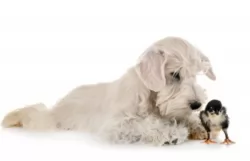 MyDogBreeds
MyDogBreeds White Schnauzer is originated from Germany but Shepard Labrador is originated from United States. White Schnauzer may grow 26 cm / 10 inches shorter than Shepard Labrador. White Schnauzer may weigh 29 kg / 63 pounds lesser than Shepard Labrador. Both White Schnauzer and Shepard Labrador has same life span. Both White Schnauzer and Shepard Labrador has almost same litter size. White Schnauzer requires Moderate maintenance. But Shepard Labrador requires Low maintenance
White Schnauzer is originated from Germany but Shepard Labrador is originated from United States. White Schnauzer may grow 26 cm / 10 inches shorter than Shepard Labrador. White Schnauzer may weigh 29 kg / 63 pounds lesser than Shepard Labrador. Both White Schnauzer and Shepard Labrador has same life span. Both White Schnauzer and Shepard Labrador has almost same litter size. White Schnauzer requires Moderate maintenance. But Shepard Labrador requires Low maintenance
 The White Schnauzer was established in Germany in 2006 for people looking for this particular breed of dog but in white.
The White Schnauzer was established in Germany in 2006 for people looking for this particular breed of dog but in white.
The traditional color is salt and pepper. It seems that breed societies don’t allow the white breed, saying they don’t conform to the ideal breed standard.
The White Schnauzer is officially recognized in Germany, If you have a White Schnauzer you may not be able to show him with some of the major kennel clubs.
White is one of the four color varieties of the Miniature Schnauzer and it is also recognized by the Fédération Cynologique Internationale.
 The Labrador/German Shepherd mix, known as the Shepard Labrador was no doubt first bred in the United States from two very popular dog breeds - the Labrador and the German Shepherd.
The Labrador/German Shepherd mix, known as the Shepard Labrador was no doubt first bred in the United States from two very popular dog breeds - the Labrador and the German Shepherd.
Breeders of this dog were looking to bring about a dog that could be an exceptional companion with characteristics from both breeds.
Also referred to as the Sheprador, the dog will surely have an amazing temperament.
 There are a number of different types of White Schnauzer. The white Schnauzer is actually one of 4 color varieties and these dogs are always miniature Schnauzers.
There are a number of different types of White Schnauzer. The white Schnauzer is actually one of 4 color varieties and these dogs are always miniature Schnauzers.
You won’t easily find a Standard- or Giant dog in white. They aren’t albinos, as the skin does have some pigment.
These dogs also have that square-shaped build and they stand between 28 to 36 cm in height and weigh between 4 and 7kg.
The coat is wiry with a soft undercoat. The ears are often cropped to stand erect, but if left they are half-erect, half-floppy and fold forward.
The White Schnauzer is an intelligent dog who will be able to be socialized and trained easily.
He is an energetic little dog and very playful and will get along well with children, loving the games they provide and loving to spend time with all members of his family.
He is loving and affectionate and is willing to share his home and people with other dogs too. He will make you a good watchdog, perhaps encouraged because of his reserve with strangers.
If you provide him with the right amount of mental and physical stimulation, he can become a balanced dog with an amicable personality.
 With the Shepard Labrador, because the puppies come from two pure breeds – the Labrador and the German Shepherd, there is no really knowing how your pet will turn out. There is therefore no standard appearance.
With the Shepard Labrador, because the puppies come from two pure breeds – the Labrador and the German Shepherd, there is no really knowing how your pet will turn out. There is therefore no standard appearance.
Some will have floppy ears like the Labrador, some erect ears like the German Shepherd. The tail will always be long. The coat will always be thick and be short to medium in length. Some puppies will be born with a fawn shade and others will have the dark colors of the German Shepherd. Some will have a mix of colors.
They will be fairly large dogs standing at between 53 and 62m in height and weighing between 23 and 36kg.
Between two such splendid dog breeds, you’re guaranteed to get a wonderful temperament – after all, that's why the two breeds were brought together. Your Shepard Labrador will be friendly, playful, social,smart, courageous, loving, loyal and energetic, just loving to be around his human family.
These dogs get on well with children, and with training and socialization will get on well with other pets in the home. This dog really makes a splendid family pet.
 The White Schnauzer is such an adaptable little dog and he will happily adapt to life in the city or in the countryside, just so long as he is close to his human companions and gets sufficient exercise.
The White Schnauzer is such an adaptable little dog and he will happily adapt to life in the city or in the countryside, just so long as he is close to his human companions and gets sufficient exercise.
He is a sociable dog that just loves to be around his human family and won’t like to be separated from them for too long.
He makes a great family dog when you provide him with the right food, a warm dry place to sleep, exercise and lots of love and attention.
 There are studies that show that dogs provide us with so many good things – companionship, comfort and relaxation.They provide us with entertainment too because some of them are so amusing with their antics.
There are studies that show that dogs provide us with so many good things – companionship, comfort and relaxation.They provide us with entertainment too because some of them are so amusing with their antics.
The Shepard Labrador is like that – he is social, friendly, loving and devoted and by bringing him into your home, you’re signing up for 10 – 14 years of sheer pleasure, less stress and superb companionship.
 While he is a spunky, robust type of dog, there are always going to be some health concerns to look out for.
While he is a spunky, robust type of dog, there are always going to be some health concerns to look out for.
Kidney stones may well not cause your pet the same pain that humans endure, but they are still a cause for concern. A kidney stone that gets too large and lodges in the ureter becomes a ureterolith. This can be very painful, resulting in pain and even vomiting.
The kidney can even swell and become damaged. Your dog could become critically ill, particularly because of the disrupted flow of urine.
Your pet will possibly have blood in the urine, fever, lethargy, poor appetite and weight loss. Veterinary-intervention will be imperative.
 The Shepard Labrador is a healthy dog breed, and with the right nutrition and exercise can reach 10 to 14 years of age. There are always going to be those common dog illnesses that many dogs succumb to. Some of them are hip dysplasia, cancer, skin problems and parasites.
The Shepard Labrador is a healthy dog breed, and with the right nutrition and exercise can reach 10 to 14 years of age. There are always going to be those common dog illnesses that many dogs succumb to. Some of them are hip dysplasia, cancer, skin problems and parasites.
Hip dysplasia is a condition where parts of the hip joints don’t fit properly together. This creates a situation where there is abnormal wear and tear on the joints. It can lead to arthritis even and pain for your dog.
The tapeworm is a parasite spread to dogs but also to people, and it is through the ingestion of infected fleas. You can often detect this when you discover parts of the worm crawling in your dog’s bowel movements or they can be around the anus. You can suspect this when you see your pet losing weight and having diarrhea. Speak to your vet about how to control fleas with your dog.
This is a fatal disease where dogs are infected through bites from rabid animals. You’ll notice horrible behavioral changes in your dog. Unfortunately with this terrible disease, once symptoms appear, it is virtually too late for treatment.
 He is a low shedding breed so he will require a brushing just once a week. These dogs also have a certain professional grooming cut. Some schnauzer dog owners do stripping but this is mostly for show dogs.
He is a low shedding breed so he will require a brushing just once a week. These dogs also have a certain professional grooming cut. Some schnauzer dog owners do stripping but this is mostly for show dogs.
Most people just have them sheared to make it easy to groom them. Whether stripped or clipped, they nearly always have a beard and bushy eyebrows.
Trim your pet's nails and give him a general once-over during the grooming sessions to ensure all is well.
You White Schnauzer relies on you to make wise food choices for him. He will eat most things you offer him. That doesn’t mean you should as you can cause him to have a whole lot of digestive problems.
If you choose to give him commercially manufactured dog food, make sure its a high-quality one – devoid of toxic ingredients such as colorants, fillers and preservatives.
If you don’t know how to choose, your vet can show you the foods they have in stock and which would suit your pet best.
A little bit of home-made food now and then can also be good, but the food needs to be plain and simple to avoid abdominal pain. Boiled chicken brown rice and vegetables chopped up and added to the dry kibble occasionally can be a very good choice.
 ◆Brush the coat of your Shepard Labrador twice a week to rid the coat of loose hairs and to keep the coat shiny ad healthy. Many people add in the Omega 3/6 oils to the dog’s food to ensure a healthy skin and coat.
◆Brush the coat of your Shepard Labrador twice a week to rid the coat of loose hairs and to keep the coat shiny ad healthy. Many people add in the Omega 3/6 oils to the dog’s food to ensure a healthy skin and coat.
◆Check the ears and eyes for infection. Make sure there are no signs of redness and discharge.
◆Check the inside of your pet’s mouth He has no way of telling you that a rotten tooth in the mouth is causing hi tremendous pain and affecting the his health.
◆Provide your pet with a warm, dry place to sleep. Make sure if he is outdoors that he has both sun and shade.
◆Feed your pet the best food there is. Your Shepard Labrador will no doubt be served commercially manufactured food. There are good and bad varieties. Make sure it is one of the better brands to ensure you don’t end up feeding your pet foods packed full of unhealthy ingredients such as colorants, preservative and fillers.
Try and include some home-made food to the diet. Boiled chicken, brown rice or pasta and spinach, sweet potatoes and carrots are a healthy choice for your pet as it won’t upset your dog’s digestive system.
Also try and include some raw meat into the diet as this can help in fighting off skin problems. Ensure your Shepard Labrador always has access to a bowl of fresh, cool water.